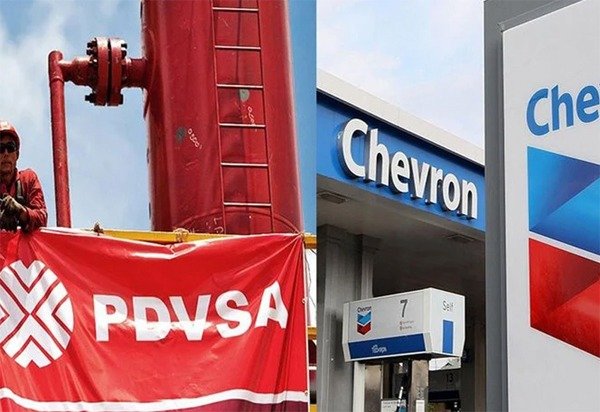
Escaping the Venezuelan Oil Dilemma: Chevron’s Rapid Exit and Broader Implications
Posted in :
Chevron’s Venezuela Exit: Oil Sanctions, U.S. Pressure & Global Impact
Recent mandate for Chevron to wind down its operations in Venezuela, the implications for other oil firms, and the broader political context affecting the global oil market.
Imagine the chaos inside Chevron’s boardroom as they scramble to comply with a sudden mandate that shifts their operational timeline from six months to just 30 days. On March 4, 2025, the Trump administration’s announcement to enforce General License 40A caught many by surprise, not just at Chevron, but across the entire energy sector. This blog delves into the repercussions of this unexpected policy change, examining the potential fallout for Venezuela and the global oil marketplace.
The Shockwaves of General License 40A
On March 4, 2025, the Trump administration made a pivotal move in the realm of U.S. oil sanctions against Venezuela. They issued General License 40A, which drastically altered the operational landscape for Chevron. The company now faces a daunting task: to wind down its operations in Venezuela within a mere 30 days. This is a stark contrast to the previous six-month timeline outlined in the now-revoked General License 40.
Operational Constraints: A Tight Timeline
Chevron’s operational constraints have been shortened drastically. This sudden change raises significant concerns. How can a company like Chevron, which has extensive operations in Venezuela, effectively manage such a rapid exit? Experts in the energy sector, including Francisco Monaldi, have voiced their apprehensions. He stated,
“Chevron’s swift exit will be anything but orderly due to the tight timeframe imposed.”
This tight timeline creates a cascade of challenges. Chevron must now navigate a complex web of logistics, legalities, and potential backlash from the Venezuelan government. The company has to load and ship Venezuelan oil starting in March, but can they do it efficiently? The clock is ticking.
Expert Opinions on the Exit Process
Many experts suggest that the exit process will be tumultuous and possibly disorganized. The abrupt nature of the decision caught many within Trump’s cabinet off guard. This may explain why the Office of Foreign Assets Control (OFAC) took five days to provide Chevron with the necessary wind-down instructions. The lack of preparation raises questions about the feasibility of an orderly exit.
- Disorganization: The sudden shift in regulations may lead to chaos.
- Legal Hurdles: The enforcement of these measures faces potential legal challenges.
- Political Pressure: Internal and external political dynamics complicate the situation.
Furthermore, the regulatory change doesn’t only affect Chevron. Other oil companies, such as Eni, Repsol, Maurel & Prom, and Reliance, also hold private authorizations to operate in Venezuela. While these permissions remain intact for now, they are expected to be revoked shortly. The U.S. Treasury is unlikely to announce these changes publicly, leaving companies in a state of uncertainty.
Lessons from the Past: The Sanctions Era of 2019-2021
The current situation draws parallels to the sanctions era experienced from 2019 to 2021. During that time, Venezuela was forced to sell its crude oil at heavily discounted rates on the black market. This led to significant revenue losses for the country. The rapid disengagement now required by General License 40A could lead to similar outcomes.
As the clock ticks down, the implications of this regulatory shift extend beyond Chevron. The possibility of the U.S. imposing restrictions on the import of refined products critical to the operation of the Orinoco Belt is a pressing concern. This area is home to Venezuela’s extra-heavy crude, and any restrictions could further complicate Chevron’s exit strategy.
Political Dynamics and Future Implications
Venezuelan President Nicolás Maduro may seek support from Iran to procure necessary diluents if the U.S. imposes further restrictions. However, this shift would not be immediate. The political backdrop includes pressure from Republican House members, who have expressed their reluctance to support a recent budget resolution unless Trump acted to cut the U.S. oil deal with Venezuela.
In summary, the implications of General License 40A are profound. Chevron’s operational constraints have been drastically shortened, leading to a tumultuous exit process. The challenges of rapid disengagement echo the difficulties faced during the sanctions era of 2019-2021. As the situation unfolds, all eyes will be on Chevron and the broader implications for U.S.-Venezuela relations.
Implications for Other Oil Companies
The recent regulatory changes affecting Chevron in Venezuela have raised significant concerns for other oil companies operating in the region. Companies like Eni and Repsol are now facing the possibility of similar restrictions. These firms currently hold private authorizations to operate, but the expectation is that these permissions may soon be revoked. What does this mean for their future in Venezuela?
Potential Restrictions on Other Firms
As Chevron begins to wind down its operations, it is likely that the U.S. Treasury will also turn its attention to other companies. The private licenses held by firms such as Eni, Repsol, Maurel & Prom, and Reliance may not be publicly disclosed, but they are under scrutiny. The implications of these changes could be profound.
- Eni and Repsol might face similar restrictions.
- Private authorizations are expected to be revoked soon.
- Companies operating under these licenses are at risk of losing their ability to function in Venezuela.
According to an energy sector analyst, “The competitive dynamics of the oil market will shift dramatically with these new policies.” This statement underscores the potential upheaval in the oil sector as companies scramble to adapt to the new regulations.
Shifting Competitive Landscape
These changes could alter the competitive landscape in the oil sector significantly. With fewer companies able to operate legally, the market may see a consolidation of power among those that remain. This could lead to increased prices and reduced availability of oil from Venezuela, a country already grappling with economic challenges.
Moreover, the potential for a return to black market sales is a pressing concern. The years from 2019 to 2021 saw Venezuela forced to sell its crude oil at heavily discounted rates on the black market. This was a direct result of sanctions and regulatory pressures. Will history repeat itself?
The Black Market’s Resurgence
The black market for Venezuelan oil could become a viable option again if the restrictions tighten. Companies may find themselves in a position where they have to choose between operating illegally or exiting the market entirely. This scenario is not just hypothetical; it has happened before.
During the previous sanctions era, Venezuela’s economy suffered greatly. The country was forced to sell oil at steep discounts, leading to significant revenue losses. If companies like Eni and Repsol are unable to operate legally, they may resort to similar tactics. The implications for the Venezuelan economy could be dire.
The Role of the U.S. Treasury
The U.S. Treasury plays a crucial role in regulating foreign operations of oil companies. Their decisions can make or break a company’s ability to operate in Venezuela. As the situation evolves, the Treasury’s actions will be closely monitored by industry experts and stakeholders alike.
Many companies currently operate under private licenses that may not be publicly disclosed. This lack of transparency adds another layer of complexity to the situation. If the Treasury decides to revoke these licenses, the fallout could be significant.
A Cautious Outlook
As the dust settles from Chevron’s abrupt regulatory changes, other oil companies are left to navigate a precarious landscape. The potential for restrictions looms large, and the competitive dynamics of the oil market are at risk of shifting dramatically. Companies like Eni and Repsol must prepare for what lies ahead. The fate of their operations in Venezuela hangs in the balance.
In summary, the implications of these regulatory changes extend far beyond Chevron. They raise critical questions about the future of numerous oil companies active in Venezuela. The landscape is changing, and the stakes are high.
Political Context and International Relations
The political landscape surrounding U.S.-Venezuela relations is complex and ever-changing. Recent actions by U.S. political factions, especially Republican House members, have put significant pressure on oil deals with Venezuela. This pressure could lead to drastic shifts in how both countries interact, particularly in the energy sector.
Pressure from Republican House Members
Key Republican figures, such as Mario Diaz Balart, Carlos Gimenez, and Maria Elvira Salazar, have been vocal about their stance on U.S.-Venezuela oil relations. They argue that tightening oil deals with Venezuela is essential for U.S. interests. Their influence is palpable, especially in light of recent regulatory changes that have forced companies like Chevron to wind down operations in Venezuela within a mere 30 days.
This abrupt decision, mandated by the Trump administration, has raised eyebrows. It shortens the timeline significantly from the previous six-month period, creating a chaotic exit for Chevron and potentially other companies operating in the region. The implications extend beyond Chevron, as other firms like Eni and Repsol may soon face similar restrictions.
Speculations on Venezuela’s Alliances
As U.S. restrictions tighten, there are growing speculations about Venezuela’s potential shift towards Iran for support. If the U.S. were to impose further sanctions, Venezuelan President Nicolás Maduro might seek assistance from Iran to procure necessary resources, such as diluents for oil production. This scenario raises questions about the future of U.S.-Venezuela relations and the geopolitical landscape in Latin America.
Political analyst Francisco Monaldi warns that this transition would not be immediate. However, the possibility of Venezuela aligning with Iran could have far-reaching consequences. It may not only affect oil production but also reshape alliances in the region.
Legal Ramifications of Sanctions
The enforcement of sanctions within Venezuela is fraught with legal complications. The Simón Bolívar Law, which classifies any support for unilateral sanctions as treasonous, poses significant challenges. This law could empower Maduro’s government to suppress dissent, as noted in the quote:
“U.S. actions could empower the Maduro government to suppress dissent.” – Political Analyst
Such legal hurdles complicate the enforcement of U.S. sanctions and may inadvertently strengthen the Maduro regime. The political backdrop to these developments is critical. The pressure from Republican House members is not just about oil; it reflects a broader strategy to influence Venezuela’s political landscape.
Implications for Oil Companies
Recent political maneuvers may drastically impact the future of U.S.-Venezuela relations and the operational viability of oil companies in the region. The wind-down of Chevron’s operations is reminiscent of the sanctions era from 2019 to 2021, during which Venezuela had to sell its crude oil at heavily discounted rates on the black market. This resulted in substantial revenue losses for the country.
As the U.S. Treasury considers the status of other oil companies operating in Venezuela, the uncertainty looms large. While current permissions for companies like Repsol and Reliance remain intact, they are expected to be revoked soon. However, the U.S. Treasury is unlikely to announce such changes publicly, given the private licenses under which these companies operate.
The political context surrounding U.S.-Venezuela relations is intricate and fraught with uncertainty. The pressure from Republican factions to tighten oil deals, the potential for Venezuela to seek support from Iran, and the legal ramifications of sanctions all play a crucial role in shaping the future of this relationship. As the situation evolves, it remains to be seen how these dynamics will affect not only the oil industry but also the broader geopolitical landscape in Latin America. The stakes are high, and the implications of these decisions will resonate for years to come.
TL;DR: Chevron faces unprecedented pressure to exit Venezuela within 30 days due to new U.S. regulations, raising broader concerns for the oil industry and Venezuelan economic stability.
TrumpAdministrationPolicies, PoliticalImpactOnOil, OilCompanyRegulations, GeneralLicense40A, VenezuelaOilNews, VenezuelanCrudeOilMarket, EnergySectorImplications, ChevronOperations, USTreasuryOilSanctions
#VenezuelaOilNews, #EnergySectorImplications, #TrumpAdministrationPolicies, #ChevronOperations, #GeneralLicense40A, #PoliticalImpactOnOil, #OilCompanyRegulations, #USTreasuryOilSanctions, #VenezuelanCrudeOilMarket,#Chevron, #Venezuela, #OilSanctions, #USForeignPolicy, #GeneralLicense40A, #EnergyPolitics, #NicolasMaduro, #OrinocoBelt, #GlobalOilMarkets, #GeopoliticalRisk

